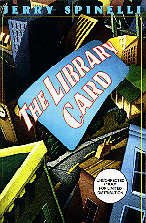


|
The Library Card.
Jerry Spinelli. Subject Headings: Review by Dave Jenkinson. *** /4 Note: Book was reviewed from uncorrected proofs. |

excerpt:
I loved my library card. It was all creased and smudged and spilled on, and the corners were rounded and furry. But it was the only official card I have ever had, and the reason it was so beat-up was because I carried it with me everywhere, because I never knew when I might need it. My mother said it was a good thing I had it too, letting me bring books home, because otherwise I would never leave the library, because I couldn't stop reading. She would have to bring my meals to the library and send along my stuffed red hippo so I could sleep right. We used to laugh about that.
The excerpt's speaker, April Mendez, 11 1/2, is the only character from this collection of four independent stories who, initially, is an avid reader, but all of the book's major characters find their lives changed because of their contact with a blue-coloured library card. In the opening piece, Mongoose, two shoplifting 12-year-old buddies, Jamie "Mongoose" Hill and Bobby "Weasel" Morgan seem destined for lives of crime until Mongoose meets the fact-filled library book, "I Wonder." Discovering this new world of wondrous information, Mongoose increasingly has less in common with Weasel, and the pair's friendship ends.
In Brenda, TV addicted Brenda Foster, having agreed to participate in her school's "Great TV Turn Off," must endure a week without her "drug." After some days, a sleepwalking Brenda visits a library and finds a biography of herself which abruptly concludes, "One day Brenda turned on the television." An alarmed Brenda uses the remainder of the week to substitute real living for TV's make-believe world. Though thrilled by Brenda's change, her mother wonders what Brenda will do when the TV embargo is lifted.
Since he was five, Sonseray, of the story with the same name, has been bouncing around the country with his uncle Jack. Sonseray's negative behaviours force the two to keep moving, and readers learn that the 13-year-old's antisocial actions stem from his unsuccessful "memory search" for his dead mother. While Sonseray queries his uncle, he cannot make personal connections with the memory fragments his uncle recounts. However, a library encounter with a romance novel triggers warm recollections of a woman who read that book to him at bedtime when he was just four.
The title character of "April Mendez" is upset by her family's move to a Pennsylvania farm. One day, she finds herself aboard the local bookmobile when it is highjacked by a runaway, suicidal teenager, Nanette. When the two girls part, April writes her name and address on her library card and invites Nanette to write her, something Nanette does. Through the girls' correspondence, the connective power of the written word is again revealed.
Newbery award winning Spinelli continues to exhibit strong characterization; however, his capacity for humour only reveals itself in Brenda as the TV starved girl uses binoculars to peep through neighbours' TV flickering windows. The recurring library card provides a "Twilight Zone" eeriness to the stories.
Though characters' ages suggest an early middle school audience, the stories' emotional impact might be more fully appreciated by older readers.
Recommended.
Dave Jenkinson teaches children's and adolescent literature courses at the Faculty of Education, University of Manitoba.

To comment on this title or this review, send mail to cm@umanitoba.ca.
Copyright © 1997 the Manitoba Library Association. Reproduction for personal use is permitted only if this copyright notice is maintained. Any other reproduction is prohibited without permission.
Published by
The Manitoba Library Association
ISSN 1201-9364
TABLE OF CONTENTS FOR THIS ISSUE
AUTHORS | TITLES | MEDIA REVIEWS | BOOKSHELF | BACK ISSUES | SEARCH | HOME